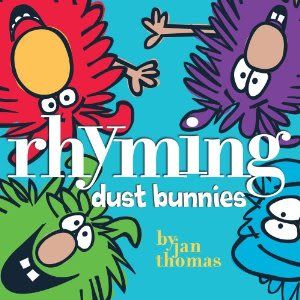In the world of children's books, my biggest pet peeve are children's books that are clearly designed to appeal to adults. And I don't mean, designed to appeal to adults, who will enjoy them on an adult level. I guess I should marketed to adults, who will buy them thinking their children will love them. "Oh yes, my baby will absolutely love this alphabetic, photographic board book designed around the Boston Red Sox!" No, your baby will not be able to focus on any of the chaotic, unclear photographs, and your toddler will insist that B is for baseball or bat, not... bunt.
Anyway, this is a a long-winded introduction to the opposite side of the spectrum, books that do not appeal to adults in any way whatsoever, but that children love. I took Rhyming Dust Bunnies out of the library a few months ago after hearing a rave review, and I did not think there was much there there, if you know what I mean. I don't even remember if I read it to my kids, or if I just returned it after glancing through it once. My younger son, though, got it as a gift for his third birthday, and I stand corrected. Both my kids adore this book.
It's a really simple conceit. There are dust bunnies. Who rhyme. (You might have gleaned that from the title.) Ed, Ned, and Ted play along perfectly, chiming in rhyming words, like "cat," "mat," and "rat." Bob continually gets scolded by throwing in words like "wait" and "stop," but it turns out that (spoiler alert) he's just trying to alert the dust bunnies that a giant monster broom is coming to sweep them up. To me, not the funniest joke in the world, but my kids both fall into giggles at this point every single time. The cartoon illustrations are lively and clear and help add a sense of energy to the text.
But the thing is, this is very cleverly designed as a perfect exercise in phonemic awareness (or, rhyming, in non-early literacy-speak). More than that, all of the rhymes are simple three-letter words that follow basic phonics rules. A child who is just learning how to read will get phenomenal satisfaction from reading this book with an adult and getting to chime in with the important words at exactly the right moment. Rather than something like a Bob book, which certainly has its place, but is necessarily limited by having to squeeze an entire story out of these super-easy-to-read words (e.g. "The fat cat sat on a rat"), I think it was really brilliant to just make these words an integral part of a larger, slightly more complicated story. There's more of a feeling of accomplishment there for the child, I think.
Highly recommended for toddlers and preschoolers learning to read.





